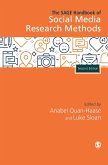The SAGE Handbook of Social Studies in Health and Medicine
Herausgegeben:Scrimshaw, Susan C.; Lane, Sandra D.; Rubinstein, Robert A.; Fisher, Julian
The SAGE Handbook of Social Studies in Health and Medicine
Herausgegeben:Scrimshaw, Susan C.; Lane, Sandra D.; Rubinstein, Robert A.; Fisher, Julian
- Gebundenes Buch
- Merkliste
- Auf die Merkliste
- Bewerten Bewerten
- Teilen
- Produkt teilen
- Produkterinnerung
- Produkterinnerung
With new chapters on key topics such as mental health, the environment, race, ethnicity and health, and pharmaceuticals, this new edition maintains its multidisciplinary framework and bridges the gap between health policy and the sociology of health. It builds upon the success of the first by encompassing a range of issues, studies, and disciplines. The broad coverage of topics in addition to new chapters present an engagement with contemporary issues, resulting in a valuable teaching aid.
This second edition brings together a diverse range of leading international scholars with…mehr
Andere Kunden interessierten sich auch für
![The Sage Handbook of Global Sexualities The Sage Handbook of Global Sexualities]() The Sage Handbook of Global Sexualities535,99 €
The Sage Handbook of Global Sexualities535,99 €![The SAGE Handbook of International Social Work The SAGE Handbook of International Social Work]() The SAGE Handbook of International Social Work155,99 €
The SAGE Handbook of International Social Work155,99 €![The SAGE Handbook of Digital Society The SAGE Handbook of Digital Society]() The SAGE Handbook of Digital Society125,99 €
The SAGE Handbook of Digital Society125,99 €![The SAGE Handbook of Social Media Research Methods The SAGE Handbook of Social Media Research Methods]() The SAGE Handbook of Social Media Research Methods125,99 €
The SAGE Handbook of Social Media Research Methods125,99 €![The SAGE Handbook of Decision Making, Assessment and Risk in Social Work The SAGE Handbook of Decision Making, Assessment and Risk in Social Work]() The SAGE Handbook of Decision Making, Assessment and Risk in Social Work140,99 €
The SAGE Handbook of Decision Making, Assessment and Risk in Social Work140,99 €![The Sage Handbook of Contemporary China The Sage Handbook of Contemporary China]() The Sage Handbook of Contemporary China539,99 €
The Sage Handbook of Contemporary China539,99 €![The Sage Handbook of Social Network Analysis The Sage Handbook of Social Network Analysis]() The Sage Handbook of Social Network Analysis140,99 €
The Sage Handbook of Social Network Analysis140,99 €-
-
-
With new chapters on key topics such as mental health, the environment, race, ethnicity and health, and pharmaceuticals, this new edition maintains its multidisciplinary framework and bridges the gap between health policy and the sociology of health. It builds upon the success of the first by encompassing a range of issues, studies, and disciplines. The broad coverage of topics in addition to new chapters present an engagement with contemporary issues, resulting in a valuable teaching aid.
This second edition brings together a diverse range of leading international scholars with contributors from Australia, Puerto-Rico, USA, Guatemala, Germany, Sri Lanka, Botswana, UK, South Sudan, Mexico, South Korea, Canada and more. The second edition of this Handbook remains a key resource for undergraduates, post-graduates, and researchers across multidisciplinary backgrounds including: medicine, health and social care, sociology, and anthropology.
PART ONE:Culture, Society and Health
PART TWO: Lived Experiences
PART THREE: Health Care Systems, Access and Use
PART FOUR: Health in Environmental and Planetary Context
This second edition brings together a diverse range of leading international scholars with contributors from Australia, Puerto-Rico, USA, Guatemala, Germany, Sri Lanka, Botswana, UK, South Sudan, Mexico, South Korea, Canada and more. The second edition of this Handbook remains a key resource for undergraduates, post-graduates, and researchers across multidisciplinary backgrounds including: medicine, health and social care, sociology, and anthropology.
PART ONE:Culture, Society and Health
PART TWO: Lived Experiences
PART THREE: Health Care Systems, Access and Use
PART FOUR: Health in Environmental and Planetary Context
Produktdetails
- Produktdetails
- Verlag: SAGE Publications Ltd / Sage Publications
- 2. Aufl.
- Seitenzahl: 704
- Erscheinungstermin: 24. Dezember 2021
- Englisch
- Abmessung: 250mm x 175mm x 42mm
- Gewicht: 1352g
- ISBN-13: 9781526440662
- ISBN-10: 1526440660
- Artikelnr.: 60982467
- Herstellerkennzeichnung
- Libri GmbH
- Europaallee 1
- 36244 Bad Hersfeld
- gpsr@libri.de
- Verlag: SAGE Publications Ltd / Sage Publications
- 2. Aufl.
- Seitenzahl: 704
- Erscheinungstermin: 24. Dezember 2021
- Englisch
- Abmessung: 250mm x 175mm x 42mm
- Gewicht: 1352g
- ISBN-13: 9781526440662
- ISBN-10: 1526440660
- Artikelnr.: 60982467
- Herstellerkennzeichnung
- Libri GmbH
- Europaallee 1
- 36244 Bad Hersfeld
- gpsr@libri.de
Susan C. Scrimshaw, PhD, was an editor and author for the first edition of this Handbook. She is a medical anthropologist who grew up in Guatemala and has worked globally, particularly in Latin America and with Latino and African American populations in the U.S. She was Dean of the University of Illinois at Chicago School of Public Health, and President of Russell Sage College. She was elected to the National Academy of Medicine in 1993, and is a Fellow of the American Anthropological Association, the Society for Applied Anthropology and the American Association for the Advancement of Science. Her awards include the Margaret Mead Award, the Adam Yarmolinsky Medal, and a Hero of Public Health Gold Medal presented by former President Vicente Fox of Mexico. Her research includes community participatory research methods, combining qualitative and quantitative research, health disparities, pregnancy outcomes, health communication, and culturally appropriate delivery of health care. Sandra D. Lane is Laura J. and L. Douglas Meredith Professor of teaching excellence in of Public Health and Anthropology at Syracuse University and a Research Professor in the Department of Obstetrics and Gynecology at Upstate Medical University. She received her Ph.D. in medical anthropology from the joint program at the University of California at San Francisco and Berkeley, and an M.P.H. in epidemiology from the University of California at Berkeley. Her research focuses on the impact of racial, ethnic and gender disadvantage on maternal, child, and family health in urban areas of the United States and the Middle East. Robert A. Rubinstein, PhD, MsPH is a distinguished Professor of Anthropology and Professor of International Relations at the Maxwell School of Syracuse University. His medical anthropology work is on infectious eye disease, psychosocial epidemiology, health inequalities, and on integrating epidemiological and anthropological methods. His political anthropology research focuses on cross-cultural aspects of conflict and dispute resolution. He is an originator of the field of the anthropology of peacekeeping, in which he has conducted empirical research and policy studies. Rubinstein has collaborated with the International Peace Academy, the United Nations Departments of Peacekeeping Operations and Internal Oversight Services, and the United States Army Peacekeeping Institute. His work has been funded by the Ford Foundation, the Edna McConnell Foundation, the US Institute of Peace, the National Science Foundation, and the Wenner-Gren Foundation, among others. He is the author or editor of 9 books and more than 100 journal articles and book chapters. He received the 2016 Victor Sidel and Barry Levy Award for Peace from the American Public Health Association, and the 2010 Robert B. Textor and Family Prize for Anticipatory Anthropology from the American Anthropological Association. Julian Fisher is a policy advisor and analyst with focused expertise in lifelong learning, health workforce education, social and environmental determinants of health, and health in all policy approaches. Julian holds adjunct teaching positions; Research Assistant Professor, Department of Public Health and Preventive Medicine (SUNY Upstate Medical University, New York, USA), and School of Health Sciences and Public Health (University of Georgia, Tbilisi, Georgia). He is on the Board of Directors of the World Accelerated Medically Trained Clinicians Network. His work experience covers a diverse range of professional domains including international public health policy and advocacy (consultancies for UN agencies including WHO, UNESCO & UNEP), health profession (federation) management, health workforce undergraduate and post graduate education, both classroom and web based. His work has been based in geographical locations, including Europe, Africa (Tanzania, South Africa), Saudi Arabia, Falkland Islands and Antarctica within various sectors and organizations. Julian Fisher earned his BDS (Dentistry) from Birmingham University in 1985, a MSc (HIV/AIDS) from Stellenbosch University, South Africa in 2002, and a MIH (International Health) from Charité University, Berlin in 2006.
Chapter 1: Introduction - Susan C. Scrimshaw, Sandra D. Lane, Robert A. Rubinstein, & Julian Fisher
Part 1: Culture, Society and Health
Chapter 2: Cultural Variation in the Experience of Health and Illness - Pamela I. Erickson & Cynthia A. Frank
Chapter 3: The Intersectional Impact of Race, Class, Ethnicity, and Place on Social Determinants of Health across the Life Course - Ruth Enid Zambrana, Deborah Parra-Medina, & Courtney Butler
Chapter 4: The Social Causation of Health and Illness - Johannes Siegrist
Chapter 5: The History of the Changing Concepts of Health and Illness: Outline of a General Model of Illness Categories - Bryan S. Turner
Chapter 6: The Sociomaterial Nature of the Body and Medicine - Deborah Lupton
Chapter 7: Network Analysis: The Social Bridge to Health - Douglas A. Luke & Beth Prusaczyk
Chapter 8: Personal Experience of Illness - Christine Holmberg & Martina Breuning
Chapter 9: Anthropological Approaches to Food and Nutrition - Miguel Cuj & Susan C. Scrimshaw
Chapter 10: Community Engaged Learning: Community Health and Learning Through Service in Sri Lanka - Suzanne Gaulocher, Ewen N. Wang, Vinya Ariyaratne, & Tumisang Rameria
Part 2: Lived Experiences
Chapter 11: Historical Trauma and Epigenetics - Wencheng Zhang, Gary Rodziewicz, Margaret Voss, & Sandra Lane
Chapter 12: Historical Trauma and Health Injustice in Indigenous Communities - Corinne Abrams & Lois Jircitano
Chapter 13: Refugees, Life in Host Communities, and Health Challenges - Julia McDaniel, Andrea Shaw, & Jok Madut Jok
Chapter 14: Gender and Health - Humayra Mayat, Mariel Rivera, & Sandra D. Lane
Chapter 15: A Public Health Approach to Loneliness and Isolation among Older Adults - Thomas Prohaska, Roger O'Sullican, Gerard Leavey, & Annette Burns
Chapter 16: Mental Illness, the Global Landscape of Stigma, and the Power of Social Relationships - Bernice Pescosolido & Bianca N. Manago
Chapter 17: From Ableism to Amplitude: A celebration of dis/ability - Norah A. Schwartz
Chapter 18: Social and Geo-Political Factors Influencing Trends in Substance Use - Dessa Bergen-Cico, David Otiashvili, Irma Kirtadze, & Jay Jeong Hyun Park
Part 3: Health Care Systems, Access and Use
Chapter 19: Comparative Health Systems: Paradigm Changes - Cecilia Vindrola-Padros & Linda Whiteford
Chapter 20: Health Service Utilization and Barriers to Health Care - Lutchmie Narine & Ambika Krishnakumar
Chapter 21: Measuring Health and Health Related Quality of Life - Manu Raj Mathur
Chapter 22: Lay Participation in Healthcare Policy, Planning and Practice: To What End? - Deena White
Chapter 23: Complementary and Integrative Health & Medicine (CIHM) Practices and Systems - Elizabeth A. Goldblatt & Stacey Gomes
Chapter 24: Childbirth, Midwifery, and Obstetrics: Global Issues in Maternity Care - Robbie Davis-Floyd & Ibu Robin Lim
Chapter 25: Medicalization and Pharmaceuticalisation: A Conceptual Analysis - Tom Douglass & Michael Calnan
Chapter 26: Digital Health: An Important Public Health Tool - Lina Williatte-Pellitteri, Nesrine Benyahia, Thierry Moulin, & Nicolas Giraudeau
Chapter 27: Health Behaviors and Social Media - Bhavneet Walia & Christopher Boudreaux
Part 4: Health in Environmental and Planetary Context
Chapter 28: The Ecological Paradox: Health and Environment in the 21st Century - Daniel Hryhorczuk & Alex Hryhorczuk
Chapter 29: Connecting Human Health to Nature Health: The Bridging Potential of Sustainable Food Systems - Stephan Rist & Theresa Tribaldos
Chapter 30: Syndemics and Structural Violence - Merrill Singer & Barbara Rylko-Bauer
Chapter 31: Disasters and Health - Robert A. Rubinstein
Chapter 32: Occupational Health in the 21st Century - Lorraine M. Conroy & Linda Forst
Chapter 33: Economics and Health Policy in the Context of the SDG 2030 Agenda - From idea to action - Jesús Gómez Rossi & Falk Schwendicke
Chapter 34: The Social Determinants of Lifelong Learning - Julian Fisher, Patricia Cuff, Ian Couper, Klaus von Pressentin, Roger Strasser, Lionel Green-Thompson, & Aparna Roy
Part 1: Culture, Society and Health
Chapter 2: Cultural Variation in the Experience of Health and Illness - Pamela I. Erickson & Cynthia A. Frank
Chapter 3: The Intersectional Impact of Race, Class, Ethnicity, and Place on Social Determinants of Health across the Life Course - Ruth Enid Zambrana, Deborah Parra-Medina, & Courtney Butler
Chapter 4: The Social Causation of Health and Illness - Johannes Siegrist
Chapter 5: The History of the Changing Concepts of Health and Illness: Outline of a General Model of Illness Categories - Bryan S. Turner
Chapter 6: The Sociomaterial Nature of the Body and Medicine - Deborah Lupton
Chapter 7: Network Analysis: The Social Bridge to Health - Douglas A. Luke & Beth Prusaczyk
Chapter 8: Personal Experience of Illness - Christine Holmberg & Martina Breuning
Chapter 9: Anthropological Approaches to Food and Nutrition - Miguel Cuj & Susan C. Scrimshaw
Chapter 10: Community Engaged Learning: Community Health and Learning Through Service in Sri Lanka - Suzanne Gaulocher, Ewen N. Wang, Vinya Ariyaratne, & Tumisang Rameria
Part 2: Lived Experiences
Chapter 11: Historical Trauma and Epigenetics - Wencheng Zhang, Gary Rodziewicz, Margaret Voss, & Sandra Lane
Chapter 12: Historical Trauma and Health Injustice in Indigenous Communities - Corinne Abrams & Lois Jircitano
Chapter 13: Refugees, Life in Host Communities, and Health Challenges - Julia McDaniel, Andrea Shaw, & Jok Madut Jok
Chapter 14: Gender and Health - Humayra Mayat, Mariel Rivera, & Sandra D. Lane
Chapter 15: A Public Health Approach to Loneliness and Isolation among Older Adults - Thomas Prohaska, Roger O'Sullican, Gerard Leavey, & Annette Burns
Chapter 16: Mental Illness, the Global Landscape of Stigma, and the Power of Social Relationships - Bernice Pescosolido & Bianca N. Manago
Chapter 17: From Ableism to Amplitude: A celebration of dis/ability - Norah A. Schwartz
Chapter 18: Social and Geo-Political Factors Influencing Trends in Substance Use - Dessa Bergen-Cico, David Otiashvili, Irma Kirtadze, & Jay Jeong Hyun Park
Part 3: Health Care Systems, Access and Use
Chapter 19: Comparative Health Systems: Paradigm Changes - Cecilia Vindrola-Padros & Linda Whiteford
Chapter 20: Health Service Utilization and Barriers to Health Care - Lutchmie Narine & Ambika Krishnakumar
Chapter 21: Measuring Health and Health Related Quality of Life - Manu Raj Mathur
Chapter 22: Lay Participation in Healthcare Policy, Planning and Practice: To What End? - Deena White
Chapter 23: Complementary and Integrative Health & Medicine (CIHM) Practices and Systems - Elizabeth A. Goldblatt & Stacey Gomes
Chapter 24: Childbirth, Midwifery, and Obstetrics: Global Issues in Maternity Care - Robbie Davis-Floyd & Ibu Robin Lim
Chapter 25: Medicalization and Pharmaceuticalisation: A Conceptual Analysis - Tom Douglass & Michael Calnan
Chapter 26: Digital Health: An Important Public Health Tool - Lina Williatte-Pellitteri, Nesrine Benyahia, Thierry Moulin, & Nicolas Giraudeau
Chapter 27: Health Behaviors and Social Media - Bhavneet Walia & Christopher Boudreaux
Part 4: Health in Environmental and Planetary Context
Chapter 28: The Ecological Paradox: Health and Environment in the 21st Century - Daniel Hryhorczuk & Alex Hryhorczuk
Chapter 29: Connecting Human Health to Nature Health: The Bridging Potential of Sustainable Food Systems - Stephan Rist & Theresa Tribaldos
Chapter 30: Syndemics and Structural Violence - Merrill Singer & Barbara Rylko-Bauer
Chapter 31: Disasters and Health - Robert A. Rubinstein
Chapter 32: Occupational Health in the 21st Century - Lorraine M. Conroy & Linda Forst
Chapter 33: Economics and Health Policy in the Context of the SDG 2030 Agenda - From idea to action - Jesús Gómez Rossi & Falk Schwendicke
Chapter 34: The Social Determinants of Lifelong Learning - Julian Fisher, Patricia Cuff, Ian Couper, Klaus von Pressentin, Roger Strasser, Lionel Green-Thompson, & Aparna Roy
Chapter 1: Introduction - Susan C. Scrimshaw, Sandra D. Lane, Robert A. Rubinstein, & Julian Fisher
Part 1: Culture, Society and Health
Chapter 2: Cultural Variation in the Experience of Health and Illness - Pamela I. Erickson & Cynthia A. Frank
Chapter 3: The Intersectional Impact of Race, Class, Ethnicity, and Place on Social Determinants of Health across the Life Course - Ruth Enid Zambrana, Deborah Parra-Medina, & Courtney Butler
Chapter 4: The Social Causation of Health and Illness - Johannes Siegrist
Chapter 5: The History of the Changing Concepts of Health and Illness: Outline of a General Model of Illness Categories - Bryan S. Turner
Chapter 6: The Sociomaterial Nature of the Body and Medicine - Deborah Lupton
Chapter 7: Network Analysis: The Social Bridge to Health - Douglas A. Luke & Beth Prusaczyk
Chapter 8: Personal Experience of Illness - Christine Holmberg & Martina Breuning
Chapter 9: Anthropological Approaches to Food and Nutrition - Miguel Cuj & Susan C. Scrimshaw
Chapter 10: Community Engaged Learning: Community Health and Learning Through Service in Sri Lanka - Suzanne Gaulocher, Ewen N. Wang, Vinya Ariyaratne, & Tumisang Rameria
Part 2: Lived Experiences
Chapter 11: Historical Trauma and Epigenetics - Wencheng Zhang, Gary Rodziewicz, Margaret Voss, & Sandra Lane
Chapter 12: Historical Trauma and Health Injustice in Indigenous Communities - Corinne Abrams & Lois Jircitano
Chapter 13: Refugees, Life in Host Communities, and Health Challenges - Julia McDaniel, Andrea Shaw, & Jok Madut Jok
Chapter 14: Gender and Health - Humayra Mayat, Mariel Rivera, & Sandra D. Lane
Chapter 15: A Public Health Approach to Loneliness and Isolation among Older Adults - Thomas Prohaska, Roger O'Sullican, Gerard Leavey, & Annette Burns
Chapter 16: Mental Illness, the Global Landscape of Stigma, and the Power of Social Relationships - Bernice Pescosolido & Bianca N. Manago
Chapter 17: From Ableism to Amplitude: A celebration of dis/ability - Norah A. Schwartz
Chapter 18: Social and Geo-Political Factors Influencing Trends in Substance Use - Dessa Bergen-Cico, David Otiashvili, Irma Kirtadze, & Jay Jeong Hyun Park
Part 3: Health Care Systems, Access and Use
Chapter 19: Comparative Health Systems: Paradigm Changes - Cecilia Vindrola-Padros & Linda Whiteford
Chapter 20: Health Service Utilization and Barriers to Health Care - Lutchmie Narine & Ambika Krishnakumar
Chapter 21: Measuring Health and Health Related Quality of Life - Manu Raj Mathur
Chapter 22: Lay Participation in Healthcare Policy, Planning and Practice: To What End? - Deena White
Chapter 23: Complementary and Integrative Health & Medicine (CIHM) Practices and Systems - Elizabeth A. Goldblatt & Stacey Gomes
Chapter 24: Childbirth, Midwifery, and Obstetrics: Global Issues in Maternity Care - Robbie Davis-Floyd & Ibu Robin Lim
Chapter 25: Medicalization and Pharmaceuticalisation: A Conceptual Analysis - Tom Douglass & Michael Calnan
Chapter 26: Digital Health: An Important Public Health Tool - Lina Williatte-Pellitteri, Nesrine Benyahia, Thierry Moulin, & Nicolas Giraudeau
Chapter 27: Health Behaviors and Social Media - Bhavneet Walia & Christopher Boudreaux
Part 4: Health in Environmental and Planetary Context
Chapter 28: The Ecological Paradox: Health and Environment in the 21st Century - Daniel Hryhorczuk & Alex Hryhorczuk
Chapter 29: Connecting Human Health to Nature Health: The Bridging Potential of Sustainable Food Systems - Stephan Rist & Theresa Tribaldos
Chapter 30: Syndemics and Structural Violence - Merrill Singer & Barbara Rylko-Bauer
Chapter 31: Disasters and Health - Robert A. Rubinstein
Chapter 32: Occupational Health in the 21st Century - Lorraine M. Conroy & Linda Forst
Chapter 33: Economics and Health Policy in the Context of the SDG 2030 Agenda - From idea to action - Jesús Gómez Rossi & Falk Schwendicke
Chapter 34: The Social Determinants of Lifelong Learning - Julian Fisher, Patricia Cuff, Ian Couper, Klaus von Pressentin, Roger Strasser, Lionel Green-Thompson, & Aparna Roy
Part 1: Culture, Society and Health
Chapter 2: Cultural Variation in the Experience of Health and Illness - Pamela I. Erickson & Cynthia A. Frank
Chapter 3: The Intersectional Impact of Race, Class, Ethnicity, and Place on Social Determinants of Health across the Life Course - Ruth Enid Zambrana, Deborah Parra-Medina, & Courtney Butler
Chapter 4: The Social Causation of Health and Illness - Johannes Siegrist
Chapter 5: The History of the Changing Concepts of Health and Illness: Outline of a General Model of Illness Categories - Bryan S. Turner
Chapter 6: The Sociomaterial Nature of the Body and Medicine - Deborah Lupton
Chapter 7: Network Analysis: The Social Bridge to Health - Douglas A. Luke & Beth Prusaczyk
Chapter 8: Personal Experience of Illness - Christine Holmberg & Martina Breuning
Chapter 9: Anthropological Approaches to Food and Nutrition - Miguel Cuj & Susan C. Scrimshaw
Chapter 10: Community Engaged Learning: Community Health and Learning Through Service in Sri Lanka - Suzanne Gaulocher, Ewen N. Wang, Vinya Ariyaratne, & Tumisang Rameria
Part 2: Lived Experiences
Chapter 11: Historical Trauma and Epigenetics - Wencheng Zhang, Gary Rodziewicz, Margaret Voss, & Sandra Lane
Chapter 12: Historical Trauma and Health Injustice in Indigenous Communities - Corinne Abrams & Lois Jircitano
Chapter 13: Refugees, Life in Host Communities, and Health Challenges - Julia McDaniel, Andrea Shaw, & Jok Madut Jok
Chapter 14: Gender and Health - Humayra Mayat, Mariel Rivera, & Sandra D. Lane
Chapter 15: A Public Health Approach to Loneliness and Isolation among Older Adults - Thomas Prohaska, Roger O'Sullican, Gerard Leavey, & Annette Burns
Chapter 16: Mental Illness, the Global Landscape of Stigma, and the Power of Social Relationships - Bernice Pescosolido & Bianca N. Manago
Chapter 17: From Ableism to Amplitude: A celebration of dis/ability - Norah A. Schwartz
Chapter 18: Social and Geo-Political Factors Influencing Trends in Substance Use - Dessa Bergen-Cico, David Otiashvili, Irma Kirtadze, & Jay Jeong Hyun Park
Part 3: Health Care Systems, Access and Use
Chapter 19: Comparative Health Systems: Paradigm Changes - Cecilia Vindrola-Padros & Linda Whiteford
Chapter 20: Health Service Utilization and Barriers to Health Care - Lutchmie Narine & Ambika Krishnakumar
Chapter 21: Measuring Health and Health Related Quality of Life - Manu Raj Mathur
Chapter 22: Lay Participation in Healthcare Policy, Planning and Practice: To What End? - Deena White
Chapter 23: Complementary and Integrative Health & Medicine (CIHM) Practices and Systems - Elizabeth A. Goldblatt & Stacey Gomes
Chapter 24: Childbirth, Midwifery, and Obstetrics: Global Issues in Maternity Care - Robbie Davis-Floyd & Ibu Robin Lim
Chapter 25: Medicalization and Pharmaceuticalisation: A Conceptual Analysis - Tom Douglass & Michael Calnan
Chapter 26: Digital Health: An Important Public Health Tool - Lina Williatte-Pellitteri, Nesrine Benyahia, Thierry Moulin, & Nicolas Giraudeau
Chapter 27: Health Behaviors and Social Media - Bhavneet Walia & Christopher Boudreaux
Part 4: Health in Environmental and Planetary Context
Chapter 28: The Ecological Paradox: Health and Environment in the 21st Century - Daniel Hryhorczuk & Alex Hryhorczuk
Chapter 29: Connecting Human Health to Nature Health: The Bridging Potential of Sustainable Food Systems - Stephan Rist & Theresa Tribaldos
Chapter 30: Syndemics and Structural Violence - Merrill Singer & Barbara Rylko-Bauer
Chapter 31: Disasters and Health - Robert A. Rubinstein
Chapter 32: Occupational Health in the 21st Century - Lorraine M. Conroy & Linda Forst
Chapter 33: Economics and Health Policy in the Context of the SDG 2030 Agenda - From idea to action - Jesús Gómez Rossi & Falk Schwendicke
Chapter 34: The Social Determinants of Lifelong Learning - Julian Fisher, Patricia Cuff, Ian Couper, Klaus von Pressentin, Roger Strasser, Lionel Green-Thompson, & Aparna Roy








